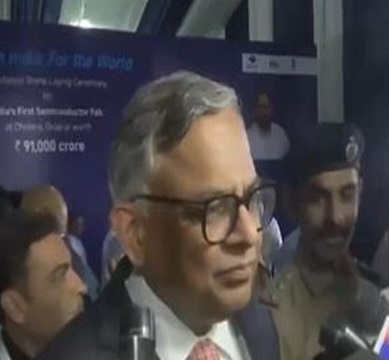Tata Group’s ambitious venture into semiconductor manufacturing took a leap forward as the foundation stones for two plants, located in Gujarat and Assam, were laid on Wednesday.
With a keen eye on accelerating timelines, Tata Sons Chairman Natarajan Chandrasekaran expressed optimism that commercial production could commence as early as 2026, potentially ushering in a new era for India’s semiconductor industry.
“We are pushing the boundaries of traditional timelines. While semiconductor fabs typically take four years to materialize, our goal is to have chips rolling out by the later part of 2026, if not earlier,” Chandrasekaran stated, underlining the group’s aggressive stance on project execution.
Highlighting the strategic significance of the initiative, Chandrasekaran emphasized the job creation potential, with an estimated 50,000 employment opportunities set to emerge from the plants in Gujarat and Assam. This move aligns with India’s self-reliance aspirations, colloquially termed ‘Atmanirbhar Bharat’, aiming to bolster domestic manufacturing capabilities and reduce reliance on imports.
In a bid to strengthen the semiconductor ecosystem, the Indian government has introduced Production Linked Incentive (PLI) schemes across various sectors, including electronics, to enhance competitiveness, attract investments, and foster integration into global supply chains.
Tata Electronics Private Limited (TEPL) is spearheading the semiconductor fab project in Dholera, Gujarat, in collaboration with Powerchip Semiconductor Manufacturing Corp (PSMC) from Taiwan. With an investment of Rs. 91,000 crore, this facility is poised to churn out 50,000 wafer starts per month (WSPM), significantly bolstering India’s semiconductor production capacity.
Meanwhile, Tata Semiconductor Assembly and Test Pvt Ltd (TSAT) are gearing up to establish a semiconductor unit in Morigaon, Assam, with a production capacity of one million chips per day. Valued at Rs. 27,000 crore, this facility will cater to a diverse range of segments, including automotive, consumer electronics, and telecommunications.
Chandrasekaran, reflecting on the occasion, compared semiconductors’ role in digital products to steel in physical infrastructure. He stressed the crucial need for indigenous manufacturing, highlighted during semiconductor shortages worsened by COVID-19, to ensure national security and promote local innovation.
















